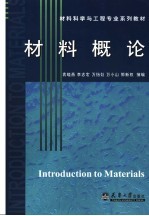图书介绍
材料概论 双语PDF|Epub|txt|kindle电子书版本网盘下载

- 袁晓燕等编 著
- 出版社: 天津:天津大学出版社
- ISBN:7561823428
- 出版时间:2006
- 标注页数:158页
- 文件大小:20MB
- 文件页数:167页
- 主题词:材料科学-高等学校-教材-英、汉
PDF下载
下载说明
材料概论 双语PDF格式电子书版下载
下载的文件为RAR压缩包。需要使用解压软件进行解压得到PDF格式图书。建议使用BT下载工具Free Download Manager进行下载,简称FDM(免费,没有广告,支持多平台)。本站资源全部打包为BT种子。所以需要使用专业的BT下载软件进行下载。如BitComet qBittorrent uTorrent等BT下载工具。迅雷目前由于本站不是热门资源。不推荐使用!后期资源热门了。安装了迅雷也可以迅雷进行下载!
(文件页数 要大于 标注页数,上中下等多册电子书除外)
注意:本站所有压缩包均有解压码: 点击下载压缩包解压工具
图书目录
1 Introduction1
1.1 Historical perspective1
1.2 Classification of materials1
1.3 Structures of metals and ceramics2
1.3.1 Structure of metals2
1.3.2 Structure of ceramics6
1.4 Polymer structures7
1.4.1 Macromolecules7
1.4.2 Molecular weight8
1.4.3 Molecular structures9
Keywords10
Problems10
Selected from11
2.1 Structure and properties of steel12
2 Metal Materials12
2.1.1 Iron-carbon alloys13
2.1.2 Strength versus carbon content in steels14
2.1.3 Formation of pearlite16
2.1.4 Effect of cooling rate20
2.1.5 Alloying elements21
2.1.6 Selecting carbon steels22
2.2 Heat treatment of steels24
2.2.1 Response of steels to heat treatment24
2.2.2 Hardenability26
2.2.3 Surface hardening27
2.2.4 Tempering28
2.2.5 Choice of heat treatment29
2.3 Stainless steels30
2.3.1 Composition,nomenclature and general properties30
2.3.2 Common stainless steel alloy systems33
2.3.3 Corrosion behavior of stainless steels34
2.4 Nonferrous alloys39
2.4.1 Copper and its alloys39
2.4.2 Aluminum and its alloys41
2.4.3 Magnesium and its alloys43
2.4.4 Titanium and its alloys44
2.4.5 Refractory metals45
2.4.6 Superalloys46
2.4.7 Noble metals46
2.4.8 Miscellaneous nonferrous alloys46
Keywords47
Problems47
Selected from48
3.1.1 Definition of ceramics49
3.1.2 Classification of ceramics49
3.1 Introduction to ceramics49
3 Ceramic Materials49
3.1.3 Overview of ceramic and glass manufacturing50
3.1.4 Structure and properties of ceramics51
3.1.5 History of ceramics52
3.1.6 Impact on society52
3.2 What are advanced ceramics55
3.3 Structural ceramics and its development57
3.3.1 Introduction and current status57
3.3.2 Trends57
3.3.3 Future work strategies59
3.4 Electroceramics and its developing directions60
3.4.1 What are electroceramics60
3.4.2 Common applications for electroceramies60
3.4.3 Fundamental research needs and developing trends for electroceramics61
3.5 Bioceramics65
3.5.1 Introduction65
3.5.2 Bioinert and bioactive materials66
3.5.3 Compatibility between bioceramics and the human environment67
3.5.4 Most common bioceramics68
3.5.5 Uses for bioceramics69
3.6 Advanced ceramic materials:Summary of possible applications71
3.6.1 Introduction71
3.6.2 State of the art71
3.6.3 Trends for the future73
3.7 Advanced ceramic materials:Basic research viewpoint78
3.7.1 Introduction78
3.7.2 State of the art79
3.7.3 Trends in technology80
3.7.4 Needs for future basic research81
Keywords85
Problems86
Selected from86
4 Polymer Materials87
4.1 Introduction87
4.1.1 Formation87
4.1.2 Classification89
4.1.3 Nomenclature90
4.1.4 History91
4.2 Natural polymers93
4.2.1 Polysaccharides93
4.2.2 Proteins96
4.3 Thermoplastics97
4.3.1 Polyethylene99
4.3.2 Polypropylene105
4.3.3 Polystyrene107
4.3.4 Poly(vinyl chloride)108
4.4 Engineering plastics and thermosets110
4.4.1 Nylons111
4.4.2 Polyesters113
4.4.3 Polycarbonates114
4.4.4 Polysiloxanes115
4.4.5 Epoxy resins116
4.5 Applications of polymers117
4.5.1 Membrane separations118
4.5.2 Biomedical applications123
4.5.3 Applications in electronics126
Keywords129
Problems129
Selected from130
5 ComPosite Materials132
5.1 Introduction132
5.2 Dispersion-strengthened composites132
5.3 True particulate composites134
5.4 Fiber-reinforced composites137
5.5 Characteristics of fiber-reinforced composites139
5.6 Manufacturing fibers and composites144
5.7 Fiber-reinforced systems and applications148
5.8 Laminar composite materials153
5.9 Examples and applications of laminar composites154
5.10 Sandwich structures156
Keywords157
Problems157
Selected from157